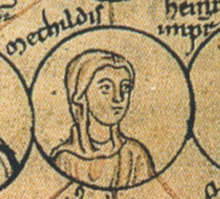Matilda of Germany (979–1025)
| Matilda | |
|---|---|
 |
|
| Countess Palatine of Lotharingia | |
| Born | Summer 979 |
| Died | November 1025 Brauweiler Abbey |
| Spouse | Ezzo, Count Palatine of Lotharingia |
| Issue |
Liudolf of Lotharingia Otto II, Duke of Swabia Hermann II, Archbishop of Cologne Theophanu, Abbess of Essen Richeza, Queen of Poland Adelheid, Abbess of Nijvel Heylwig, Abbess of Neuss Mathilde, Abbess of Dietkirchen and Villich Sophie, Abbess of St. Maria Ida, Abbess of Cologne |
| House | Ottonian Dynasty |
| Father | Otto II, Holy Roman Emperor |
| Mother | Theophanu |
| Religion | Roman Catholic |
Matilda of Germany or Matilde of Saxony (Summer 979 - November 1025, Echtz) was the third daughter of Otto II, Holy Roman Emperor and his wife, Empress Theophanu.
Shortly after her birth, Matilda was sent to Essen Abbey, where her older cousin Mathilde was abbess, Matilda was educated here. It was presumed that Matilda would stay in the Abbey and become an Abbess like her older sisters Adelheid I, Abbess of Quedlinburg and Sophia I, Abbess of Gandersheim.
However, Matilda lived a different life from her two sisters, she was to marry Ezzo, Count Palatine of Lotharingia. According to the Historian Thietmar of Merseburg Matilda's brother Otto III, Holy Roman Emperor did not like the idea of the marriage at first. The family gave the couple large gifts to secure an adequate standard of living. The Empress Theophanu had consented to the marriage. Ezzo then took Matilda out of the Abbey where she had lived. However, Abbess Mathilde had vainly refused to surrender the girl. Later romantic embellishments even claimed Ezzo had previously been secretly in love with the young Matilda. Ezzo took Matilda from the Abbey to marry her.
Matilda's mother Theophanu had always agreed to the wedding but Matilda's cousin and teacher Abbess Matilde did not agree to the marriage. Without the consent of Matilda's mother the marriage would not happen with certainty, it is even likely that this marriage was to ensure the power of Otto III. The family had extensive estates in the Lower Rhine and Mosel. Ezzo's mother came from the House of Swabia and so Ezzo laid claims to these lands. Matilda received them out of Ottonian possessions and gave them to her husband.
Ezzo and Matilda had married for love and their marriage was very happy. In any case, it was extremely fruitful, with ten children:
Matilda apparently died unexpectedly during a visit to Ezzo's brother Hermann, while Ezzo was held in Aachen, at a meeting of the nobility of Lorraine. Matilda was buried at Brauweiler Abbey.
...
Wikipedia
